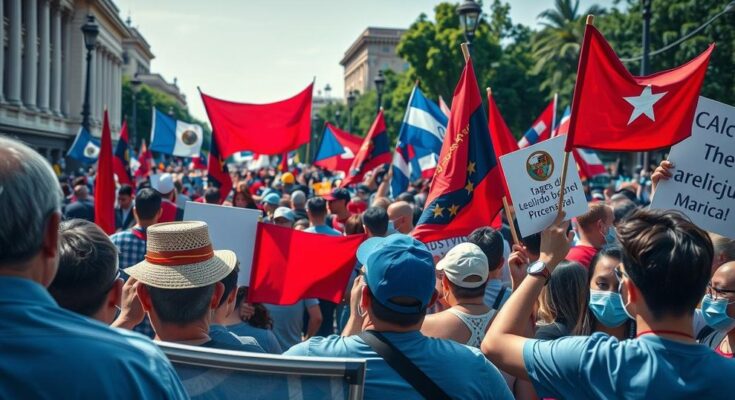Argentina is set for a 24-hour strike amid protests against President Javier Milei’s austerity measures, which, while resulting in budget surpluses and reduced inflation, have also increased poverty. Thousands protested in Buenos Aires ahead of the strike, voicing discontent over cuts to public services. The nation awaits a critical $20 billion loan from the IMF, which could impact its economic strategies moving forward.
Argentina is currently preparing for a significant 24-hour general strike slated to begin at midnight, coinciding with widespread discontent directed against President Javier Milei’s austerity measures. Thousands gathered in Buenos Aires for peaceful anti-austerity protests, which reflect the frustration over Milei’s budget cuts initiated during his 16 months in office. This is the third such strike against what has been described as “chainsaw” austerity, referring to Milei’s symbolic use of a chainsaw during his presidential campaign to denote severe budget cuts.
Under Milei’s administration, extensive cuts to subsidies in transport, energy, and fuel have led to the dismissal of numerous public servants and the closure of various government departments. While these austerity measures have achieved Argentina’s first budget surplus in over a decade and reduced inflation, they have also plunged many citizens into deeper poverty and recession. Hector Daer, the secretary general of the CGT labor movement, expressed that the effects of these austerity measures on vulnerable populations are far more severe than what the inflation index suggests.
The strike is anticipated to disrupt transportation, closing down trains and planes, and affecting schools and financial institutions. National airline Aerolineas Argentinas has already cancelled 258 flights, impacting about 20,000 passengers, although bus drivers are not participating in this strike. Despite the government citing a drop in inflation from 211 percent to 66 percent, unions argue that this improved economic data does not reflect the dwindling purchasing power faced by ordinary citizens.
Previous protests have encountered violence, though the latest demonstration stood out for its peaceful nature. Participants, including pensioners severely impacted by the austerity cuts, rallied for their rights with visible support from labor unions and social movements. Carlos Salas, a 63-year-old civil servant, voiced his frustrations, stating, “I have had enough of this government!” and stood in opposition to the government’s policies as Argentina awaits a crucial $20 billion loan from the International Monetary Fund (IMF).
Milei has claimed that this financial support will be essential for settling debts with the central bank and aims to significantly reduce inflation as his party prepares for a mid-term legislative election. Tuesday’s announcement from the IMF indicated that a preliminary loan agreement with Argentina has been reached, with final board approval expected in the near future.
In conclusion, Argentina is facing significant economic turmoil as President Javier Milei’s austerity measures continue to provoke widespread dissent. The upcoming 24-hour general strike reflects the deep frustrations felt by the populace against cuts that, while aimed at economic stabilization, have led to increased poverty and social unrest. As the nation awaits crucial financial support from the IMF, the balance between austerity and social welfare remains a contentious issue.
Original Source: www.myleaderpaper.com




